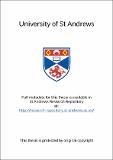Files in this item
Necessity and modal systems: an essay on modal terms
Item metadata
| dc.contributor.author | Esterline, Albert Crawford | en |
| dc.coverage.spatial | 197 p | en |
| dc.date.accessioned | 2021-04-08T08:57:03Z | |
| dc.date.available | 2021-04-08T08:57:03Z | |
| dc.date.issued | 1971 | |
| dc.identifier.uri | https://hdl.handle.net/10023/21826 | |
| dc.description.abstract | The purpose of this paper is to determine if our ordinary-language notions of modal terms furnish a basis for the development of modal logics, and if so, how and to what extent. I shall begin by distinguishing the "use" of a modal term and the "ground" for it. Briefly, the logical relations between statements are due to the uses of their terms, and the grounds for a statement are the reasons we would produce to justify its assertation. In Chapter One I shall distinguish five uses of modal terms, and in Chapter Two I shall enumerate a number of grounds for sentences containing modal terms. In the next two chapters I shall employ the results of Chapter One and Chapter Two in connection with the two most important problems facing modal logic: Iterated modalities and statements in which a quantifier binds a variable which is within the scope of a modal term. | en |
| dc.language.iso | en | en |
| dc.publisher | University of St Andrews | en |
| dc.subject.lcc | BC177.E8 | |
| dc.subject.lcsh | Language and logic | en |
| dc.subject.lcsh | Modality (Logic) | en |
| dc.title | Necessity and modal systems: an essay on modal terms | en |
| dc.type | Thesis | en |
| dc.type.qualificationlevel | Doctoral | en |
| dc.type.qualificationname | MLitt Master of Letters | en |
| dc.publisher.institution | The University of St Andrews | en |
This item appears in the following Collection(s)
Items in the St Andrews Research Repository are protected by copyright, with all rights reserved, unless otherwise indicated.

